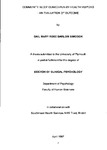COMMUNITY SLEEP CLINICS RUN BY HEALTH VISITORS -AN EVALUATION OF OUTCOME
| dc.contributor.author | BARLOW SIMCOCK, GAIL MARY-ROSE | |
| dc.contributor.other | School of Psychology | en_US |
| dc.date.accessioned | 2013-09-16T12:32:02Z | |
| dc.date.available | 2013-09-16T12:32:02Z | |
| dc.date.issued | 1997 | |
| dc.identifier | NOT AVAILABLE | en_US |
| dc.identifier.uri | http://hdl.handle.net/10026.1/1763 | |
| dc.description.abstract |
Sleep problems in babies and young children are extremely prevalent, yet until recently little attention has been paid to them by health professionals. Sleep problems have often been accepted as part of a developmental process, however research has shown that they are often not transitory, and if not treated effectively in the early years, may have long term consequences for later life. Health visitors are in an ideal position to offer treatment at a primary care level, as they are in regular contact with the families of young children. Existing research has shown that the employment of a behavioural approach is the treatment of choice for childhood sleep problems. The aims of this study were three-fold. Firstly to evaluate the efficacy of a sleep clinic run by health visitors employing behavioural techniques in the treatment of pre-school children with sleep problems. Secondly to assess what aspects of the treatment process result in the outcomes achieved; and finally to make a formal attempt to explore the influence of an improved sleeping pattern on general behaviour. Findings, using a series of n=1 studies that allowed within subject comparisons suggest that field health visitors who have received in-service training on the use of behavioural approaches are able to offer an effective service to the families of children with sleep problems. Parents identified both the behavioural and nonspecific aspects of treatment as being equally helpful, but it remains unclear what actually did help. An improvement in general behaviour was noted for all children, although this was not found to be associated with changes in sleep pattern. Due to the small number of participants, caution must be taken in generalising from the findings. The study is critically evaluated and suggestions for future research together with implications for clinical practice are discussed. | en_US |
| dc.description.sponsorship | Southmead Health Services, NHS Trust, Bristol | en_US |
| dc.language.iso | en | en_US |
| dc.publisher | University of Plymouth | en_US |
| dc.title | COMMUNITY SLEEP CLINICS RUN BY HEALTH VISITORS -AN EVALUATION OF OUTCOME | en_US |
| dc.type | Thesis | |
| plymouth.version | Full version | en_US |
| dc.identifier.doi | http://dx.doi.org/10.24382/1587 | |
| dc.identifier.doi | http://dx.doi.org/10.24382/1587 |
Files in this item
This item appears in the following Collection(s)
-
01 Research Theses Main Collection
Research Theses Main


